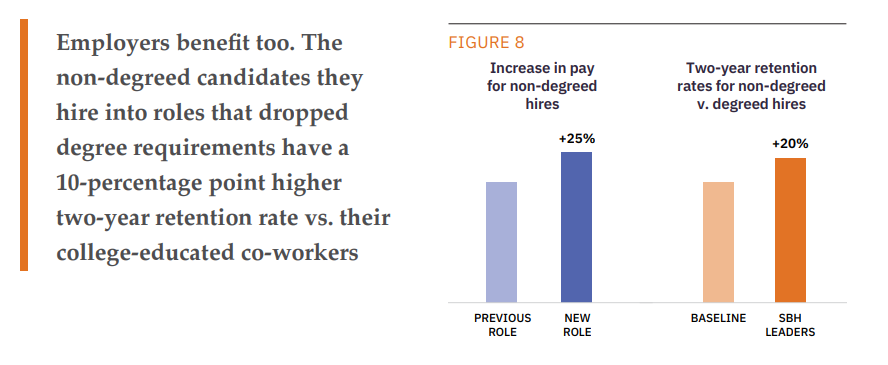It’s been quite a roller coaster ride if you ask me. Just a few months back, a flood of news highlighted how these companies committed to strip degree requirements from their postings.
Turns out, “As if…” is what their hiring data reported in a new study from Burning Glass Institute and Harvard Business School suggests.
In this article:
So Much for Promising to Make Hiring Skills-Based
Contrary to what employers promised, nearly half (45%) of firms surveyed adopted skills-based hiring in name only, the study reveals. “These firms removed degree requirements from their job postings but continued to hire the same share of degreed workers into these roles. Some even brought in a greater share.”
This ugly situation may also make you question: What about the rest of the sample? Do the 55% of surveyed employers keep their word when saying they’d commit to skills-based recruitment? Or were they, too, merely paying lip service to the concept?
The answer is both:
- Researchers found that nearly all of the change in actual hiring was driven by 37% of the firms studied. These firms are making real change, increasing their share of workers hired without BAs in the analyzed roles by nearly 20%.
- The rest of the sample accounts for 100 – 45% (firms making a change in name only) – 37% (the true skills-based hiring practitioners) = 18%. These firms are called Backsliders. They make short-term gains in realized job accessibility after they drop degree requirements, but, as their name suggests, the change doesn’t stick. At some point, these firms even wind up hiring fewer workers without BAs.
Some may be wondering now:
Does Skills-Based Hiring Worth It?
This question may bake some real hot debates, yet if we take a closer look at those skills-based hiring cheaters—many of them are big names. While big doesn’t equal smart, it’s worth digging in further.
Are these guys dummies? If not, then why did they go against their words?
Did making changes to them that hard? Or did they, in fact, find something invaluable the traditional degree-based hiring possesses that skills-based one doesn’t?
Bad news is the research didn’t unfold this question.
Good news is it shows skills-based approach does reward those adopting it in their hiring. This new concept benefits employees as well. Statically:
- Non-degreed workers have a 20% increase in retention than their degree-holder colleagues.
- Non-degreed workers hired into roles that previously required degrees experience a 25% pay raise on average.

So,
What If You Want to Skills-Based Hire Your Next Employees?
Hint: Skills-based hiring sounds great when used for the right roles. While holding a degree in singing and writing, candidates or not wouldn’t and shouldn’t be a deal breaker, the same can’t be said for roles like lawyers or doctors.
“Skills-based hiring strategies are designed for the roles where degreed and non-degreed workers have long labored together and where the degree is a matter of employer preference and not of necessity.” said the report.
It also suggested a few occupations that were found to have ended well and will likely do so with skills-based hiring:
- Distribution managers
- Production and planning clerks
- Event planners
- First-line supervisors – food preparation
- First-line supervisors – sales
- Payroll clerks
- Sales
- Document management specialists
These are roles with robust non-college pathways, typically provided through either third-party credentialing such as ‘non-credit’ programs at community colleges, for-profit skills providers, last-mile training programs, or on-the-job training.
What If You Don’t Want to Adopt Skills-Based Hiring Just Yet?
I’d love to know why. What prevents you from trying it?
If you skills-based hired candidates before, what stops you from doing it again?
What makes you think skills-based hiring isn’t worth the trade?
—
Anh


Leave a Reply